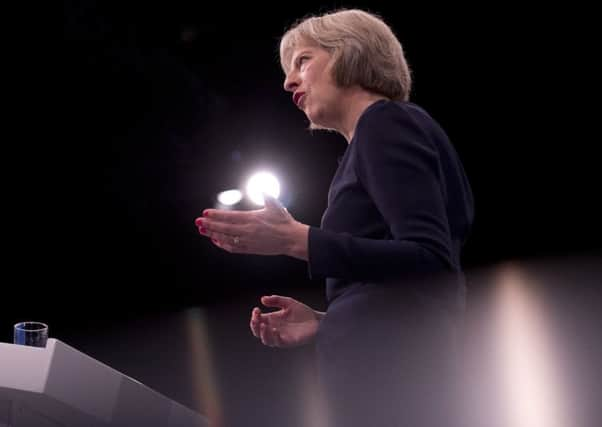Leaders: Home Secretary strays on to dangerous ground


Theresa May’s uncompromising speech to the Conservative Party conference was a significant occasion for the Home Secretary in more ways than one.
She was not only setting out the government’s stall in the wake of Europe’s migrant crisis, but also staking her own claim to the leadership.
Advertisement
Hide AdAdvertisement
Hide AdThe plans for reform of Britain’s asylum rules set out by Mrs May were substantially tougher than most commentators had expected.
And the language she deployed – noticeably harder than that used recently by Prime Minister David Cameron – signalled a clear move to distance the UK from those who are determined to bring in EU-wide quotas for refugees.
Asylum seekers who enter the UK illegally will be barred from settling permanently, while some refugees will be subject to “safe return reviews” which could lead to them being sent home if their lives are not believed to be in danger.
A month after Mr Cameron announced Britain would accept Syrian refugees by 2020, she pledged help for “vulnerable people in the world’s most dangerous places”. But there was a distinct contrast in tone when she vowed that Britain’s new rules would be “humane for those who need our help, tough on those who abuse it”.
And there was an ominous series of warnings which seemed designed to deter asylum seekers from seeking refuge in Britain in future.
Mrs May said people who had “spurned the chance to seek protection elsewhere” would not win an automatic right to stay in the UK.
And she pledged that the new policies would see Britain distinguish between “vulnerable people resettled from their region and those who claim asylum after abusing the visa system or having travelled to get here through safe countries”.
Mrs May’s speech was the toughest warning yet that the government wants to reverse the growing numbers of immigrants entering the UK, which reached a record 300,000 in the year to March. Insisting Britain would not buy into a common EU policy “in 1,000 years,” she said immigration had already put a strain on public services, pushed down wages and forced some people out of work altogether, adding: “When immigration is too high, when the pace of change is too fast, it’s impossible to build a cohesive society.”
Advertisement
Hide AdAdvertisement
Hide AdIt is on this final point that confirmation was given, if indeed any was required, that Mrs May is only interested in the negatives surrounding immigration, and not the positives. The long success in the integration of Polish and Italian immigrants in Scotland, who came here in their thousands many decades ago and have flourished as part of the character and vibrancy of Scottish society, would suggest that her own ideas are less than coherent, if not downright dangerous.
Mrs May’s outlook also pays little heed to the economic case for immigration in Scotland, with an expanded workforce desirable if growth is to be achieved. The Home Secretary’s desire to limit and thwart immigration is strong on preventative measures, but bereft of a practical approach to make a success of migration. At a time when the mass movement of people fleeing persecution has produced a humanitarian crisis, her address only reinforces the impression that the UK government doesn’t want to know.
Profits raise new festival questions
T here has been huge scepticism over the case to offer “state aid” to Scotland’s biggest music festival ever since the £150,000 grant was revealed by The Scotsman in the wake of this year’s event.
At the time it seemed an odd move by the Scottish Government to award the funding to an event which had been hailed as a huge success by its organisers.
Fiona Hyslop has made several attempts since then to explain why a hugely successful promoter like DF Concerts was pledged what amounts to emergency funding after a meeting was brokered by Jennifer Dempsie, a former aide of Alex Salmond.
MSPs sounded less than convinced last week at Ms Hyslop’s claims that DF Concerts were prepared to quit Scotland if they did not secure financial assistance to help them move to the event’s new home at Strathallan. She also told Holyrood’s culture committee that T in the Park could have been scaled back to a single-day event with only one stage.
For anyone familiar with the vast growth of T in the Park in its 21-year history and the huge audience it has attracted over the years, all this may have sounded rather unrealistic. While there is no reason to doubt Ms Hyslop’s claims about what she was told by the company, the revelation that DF Concerts posted pre-tax profits of £6.2 million last year has merely increased doubts over why such a commercially successful venture was deemed worthy of government subsidy.
But Ms Hyslop is also facing demands to explain how much scrutiny went into the claims by DF Concerts. At the moment it is hard to avoid the conclusion the company has deployed brinkmanship to win a substantial chunk of public funding.